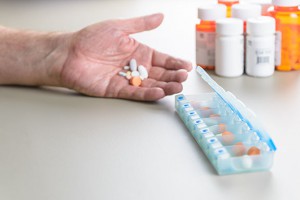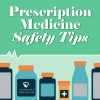Some studies have shown that people who are 65 and older may be prescribed up to 27 new medications a year. Keeping track of the drugs’ location may be difficult for seniors, much less recalling how often to take them, what dosage is necessary and any potential negative interactions to avoid. As a caregiver, you can provide much-needed assistance to seniors who have various medication plans. Here are some tips for ensuring medication safety:
Store medications properly
There is a reason doctors insist people keep medications in their appropriate bottles. The minute you take one pill and move it to another container you might forget the medicine’s name, its potential side effects and even when to provide it to your senior loved one. Always keep medicines in their original containers. Also, make sure to store them at the temperatures listed on the label. Some may require refrigeration or to be kept away from direct sunlight and heat sources.

You may find that organizing a weekly pill container that is divided by days is helpful, and that’s great! But be sure to keep the original medicine vials, bottles or other containers so you can reference them if needed. Labels always state what the medicine inside should look like, so if there is any question about the identity of a random pill, compare it to the descriptions.
Watch for interactions
Many drugs, whether prescription or over-the-counter, can interfere with one another. Some can have damaging effects if the person taking the medicine drinks or eats specific items. For example, many drugs should not be taken with alcohol as the chemicals can combine to cause headaches, stomach trouble, dizziness or sleepiness. The Food and Drug Administration offers a handy guide that features many common kinds of prescription and OTC drugs and possible food or drink interactions. Consult this resource, the medicine label or the senior’s doctor if you are concerned about a possible negative interaction. Also, be sure the individual follows a physician’s or pharmacist’s instructions on when to eat or drink milk with a medicine. Doing so can prevent unnecessary stomach pain and digestive trouble, plus it speeds up the effectiveness of the medication.
Understand drug disposal
All medications have an expiration date after which they should not be used. Pills, powders, liquids and injectables all must feature a use-by date that patients should follow. Taking even a low-dose pain reliever or antihistamine that is past its prime can result in unfortunate side effects. Always ensure the medication your senior loved one is taking has not expired. If you find drugs that have passed their use-by date, bring them to a nearby pharmacy or hospital where they will be disposed of properly. Simply tossing medication into the trash can be harmful to the environment, as it will sit in a landfill and potentially decompose into the earth or a water source. Many communities also have drop-off days like prescription-take-back programs where secure containers are available to host unwanted meds.
If you found an error, highlight it and press Shift + Enter or click here to inform us.



